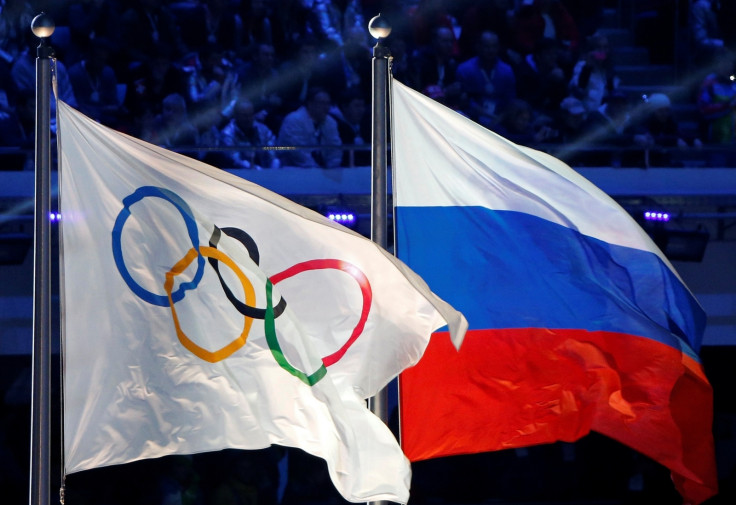Russia's notorious Olympic doping lab is now a restaurant and tourist hotspot
It sells doping-themed cocktails

Would you drink a sample from the Sochi doping lab?
The building at the center of a Russia doping scandal which rocked the 2014 Winter Olympics now hosts a restaurant celebrating its notoriety amid a tourism boom.
Former lab director Grigory Rodchenkov has testified to doping Russian stars and covering up for them, but four years on, the cocktails offered in the same space contain only alcohol, not steroids.
There's the B Sample, named after the second test that often confirms whether a doping athlete is guilty. It's a punchy shot of tequila, sambuca and hot sauce. Meldonium, the substance for which tennis star Maria Sharapova tested positive in 2016, now lends its name to a mixture of absinthe and Red Bull.
Performance-enhancing? Probably not.
The unusual menu is "so as not to forget the story of this building ... it's (about) history," manager Elena Dyatlova told The Associated Press, though she considers the doping scandals "really unpleasant for Russia."
Rodchenkov says he served a different kind of cocktail back in 2014. He's testified he dispensed steroids dissolved in vermouth or whiskey to top Russian athletes ahead of the Winter Olympics in Sochi in a state-backed doping program, then covered up their drug use by swapping tainted samples for clean ones through a hole in the wall of the lab's supposedly secure storeroom.
Any evidence of that hole seems long gone after remodeling to create the restaurant and space for other businesses.
The International Olympic Committee has upheld Rodchenkov's testimony despite objections from the Russian government. The IOC banned 43 Russian athletes from the Olympics for life and forced Russia to compete under a neutral flag at next month's Games in Pyeongchang, South Korea.
Away from the lab, Sochi is a city defined by its Olympic legacy.
Tourists flock for selfies in front of plaques in the Olympic Park bearing the names of 2014 medalists, including those sanctioned by the IOC. Time and the weather have nearly erased some names, just as the IOC has erased 13 Russian medals from its 2014 records.
For many visitors, the banned athletes are still champions.
"I react very badly to this. I think our athletes shouldn't be left like this and shouldn't be competing under a neutral flag," said Karina Tolmachyova, a lawyer from the industrial city of Saratov on her first skiing holiday in Sochi.
The Russian government spent an estimated $51 billion on the Olympics and related infrastructure for Sochi, and the city is seeing the benefits.
Deputy mayor Sergei Yurchenko says the population has boomed by 50 percent to 600,000 people since the Olympics as Russians are tempted to move south for better weather. The rapid growth is forcing local authorities to build more schools.
Sochi offers skiing in winter and beaches in summer, and Yurchenko says 6.5 million tourists visited last year, around 85 percent of them Russians.
"The Olympics was a big boost to the whole development of the city," he told the AP. "We consider the city's become practically like new, as if it were built all over again." That's certainly true of its tourism attractions, though many older houses still remain.
Political turbulence has affected other once-favored destinations, indirectly helping to boost Sochi's profile. Russian visitors spurned Turkey for much of 2016 when the two countries' governments clashed over the Turkish shootdown of a Russian fighter plane in November 2015. Flights to Egypt were suspended in 2015 and will only start again next month after an airliner carrying Russian tourists was destroyed in a suspected bombing.
In the Caucasus mountains above Sochi, business is strong too.
During the Olympics, the mountain village of Rosa Khutor was the base for many snow sports. However, numerous new shops were unfinished, prompting visitors to wonder if they'd ever open once the Olympics were finished.
Now there's an array of businesses chiefly aimed at the wealthier Russians who can afford ski lessons, while a casino draws visitors from Turkey — where gambling is severely restricted — and a concert hall advertises shows by star Russian musicians.
The next step for Sochi is the soccer World Cup in June and July. The seafront stadium which held the Olympic opening and closing ceremonies is now reconfigured as a soccer stadium to welcome teams including Cristiano Ronaldo's Portugal and world champion Germany.
Local authorities are hoping a successful World Cup will bring more foreign tourists. However, its sporting legacy is far from clear. The Fisht Olympic Stadium has hosted just seven soccer games to date, four of them at last summer's Confederations Cup, and Sochi no longer has a professional club.
FC Sochi played one game last year in front of 6,000 fans in the 47,000-seat arena, then soon after said it was "going on a one-year break" to rethink its strategy. There have been no updates on the club's status since June and its management did not respond to a request for comment.
Since 2003, there have been five failed attempts to run a club in the city, not counting the most recent incarnation of FC Sochi. All collapsed due to financial problems.
"The issue is that clubs in Russia are usually financed by (government) budgets, but in this case the Sochi city budget isn't able to support clubs," Yurchenko said. "We're all hoping that an investor will come in after the World Cup and we'll enter the 2019 season with a Sochi football club."





















